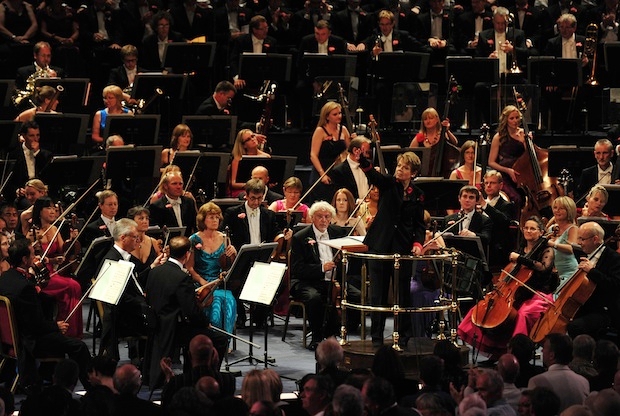Gossip that an orchestral player fainted while performing in the Albert Hall during the recent heatwave points to a strange lacuna in the policing of concert conditions. The unions who like to stipulate how professional musicians are treated — Equity and the MU — have long made a big song and dance about minimum temperatures in the workplace. If the temperature falls below the agreed level, we are all entitled to walk out, without any further questions asked, since obviously the management is trying to save money on heating bills, to the detriment of the workers’ health.
But global warming has produced a different set of difficulties. In their ancient wisdom our shop-floor reps seem not to have worked out that the scumbags might be saving on air-conditioning units as much as on heaters. Perhaps they think that something as un-British as an air-conditioning unit would never galvanise the workforce in the same way. Yet we are asked to perform at the highest level with sweat pouring down our faces, on to our spectacles, thence to our rapidly yellowing and disintegrating copies, while the audience watch us pitilessly as if we are animals in a cage; and nobody thinks to do anything about it.
Certainly the Albert Hall is a difficult place to manage. The sheer size of it, not to mention its porous design, makes it fabulously expensive either to heat or chill. They can’t really win there. John Eliot Gardiner’s Bachathon on 5 May this year was so cold that the audience was leaving: the building was emphasising the outside temperature, which wasn’t that bad. Conversely, the Proms have been roasting, even at close to midnight, which was when the recent Tallis Scholars Prom ended.
A contributing factor may well be the lights. We often enter what seem like quite promising-looking buildings — cool churches, big symphony halls, spaces such as the Albert Hall — only to find that their interiors are naturally so dark that the stage has to be lit artificially. Standing in front of a bank of those bulbs drilling into the back of one’s head very quickly makes one long to go outside again. Not that this was such a problem for us in the Albert Hall, since the organisers have become adept at reducing the amount of light in use, in the interests of making the stage seem a more intimate place. This is clever stuff, since for the first time in repeated appearances on that stage I forgot to worry about how far away the furthest listeners can be in there, and allowed the soft passages to be as soft as they would be in a much smaller place. The result was relaxation all round.
Less relaxing is starting a concert at 10.15 p.m. There are not many festivals that expect their artists to perform so late, and in any other forum one might think twice about it, especially when presenting unaccompanied voices. The problem is that the period of discomfort which for me always precedes a public appearance is extended into what is normally the period of relaxation. If it happens to be hot as well as late, one begins to notice how thirsty one is — hours before the off. Pent-up sobriety, followed by suddenly coming face to face with thousands of people in a vast arena, is a unique test of stamina. I don’t know how I would cope if I had been drinking, since arriving on that stage makes me go wobbly at the knees anyway.
Travelling around the European summer festival circuit in 40 degrees is a test of a different kind. No one is quite at their best. The idea of holding big-name concerts in very remote parts of, let’s say, France, is lovely in theory. What could be nicer than that the ancient abbey in the middle of a field be filled with the sound of chanting? The fact that it is also filled with wildlife of every kind, including insects that love to congregate around bright lights and may well find their way into open mouths, never seems to blunt the enthusiasm of the planners, until they near the end of those two hot weeks of their festival spent welcoming their public, their artists and all their endless complaints. Then everyone wishes that the air-conditioning in the Z-grade hotels to be found in rural France worked properly. And the moment the heat finally does reduce in early October, what happens? They plan to do the whole thing all over again.
But how well one feels at three in the morning! I’d be surprised if there is a happier time all year than the middle of an August night, after a good concert, sitting under the trees with one’s colleagues, drink in hand. Strange preparation for the concert later that day, hundreds of miles away.






Comments